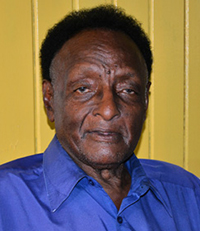Officer was not acting under an excise law
BECAUSE Investigation Officer Cpl. De Abreu was not acting under an excise law at the

material time when he implemented a Bush Rum charge against three appellants causing them to be convicted and sentenced by a magistrate, they were all freed by the Full Court.
The appellants appealed from their conviction for the offence of assaulting a corporal of police acting under an excise law contrary to s. 97 (a) of the Spirits Ordinance ,Cap, 319 .
At the time of the alleged offence the corporal was looking for spirits in execution of a search warrant which has been issued under section s. 9 (1) of the summary Jurisdiction (Procedure) Ordinance , Cap. 15, s 9 (1).
The Full Court was constituted by (Luckhoo, C. J., and Chung J.) May 6, 20, 1966)
K. Prasad for the appellants.
J. G. Sabola for the respondent.
Chief Justice Luckhoo who delivered the Judgment of the Court said: The three appellants, Mahadeo Singh, Victoria Singh and Rudolph Solomon were charged jointly on a complaint that on the 16th September, 1965, at Springlands, Corentyne, in the Corentyne Judicial District they assaulted Corporal of Police No. 5020 Eustace de Abreu who was then acting under an excise law, contrary s.97 (a) of the Spirits ,Ordinance , Cap. 319. The appellants were convicted and were each fined $250 or in default three months’ imprisonment.
The evidence for the prosecution was to the effect that the respondent Paul Burnett , an officer of customs and excise, obtained a search warrant directed to him or any constable authorizing entry by force if necessary between the hours of 5 p. m. and 10 p.m. into the premises of the appellant Mahadeo Singh situate at Springlands for the purpose of executing the search warrant for spirits known as bush rum. On arrival there Cpl. De Abreu knocked at the door and the appellants Victoria Singh and Rudolph Solomon came to the door. Cpl.
De Abreu was in possession of the search warrant and told the appellant Victoria Singh that he had a warrant to search the premises. He showed her the warrant and offered to read it to her. She thereupon refused to allow a search of the premises and attempted to close the door. What transpired thereafter need not be recited for it has not been contended that the evidence would not sustain the charge against all three appellants if the
At about 6.40 p.m. that evening the respondent Burnett accompanied by Cpl. of Police No. 5020 Eustace de Abreu, Supernumerary Constable John, King and other policemen went to the premises of the Appellant Mahadeo Singh at Springlands for the purpose of executing the search warrant for the spirits known as Bush Rum.
On arrival there Cpl. de Abreu knocked at the door and the Appellant Victoria Singh and Rudolph Solomon came to the door. Cpl. de Abreu was in possession of the search warrant and told the appellant Victoria Singh that he had a warrant to search the premises. He showed her the warrant and offered to read it to her. She thereupon refused to allow a search of the premises and attempted to close the door. What transpired thereafter need not be recited for it has not been contended that the evidence would not sustain the charge against all three appellants the search warrant were a valid warrant.
The sole ground of appeal in respect of each of the appellants is that the decision of the learned magistrate is erroneous in point of law in that the search warrant is defective and could not authorise the police to act under an excise law.
The search warrant purports to have been issued under the provisions of the Spirit Ordinance , Cap. 319, that Ordinance being specifically mentioned therein as well as in the information upon oath leading to the warrant. There are two provisions under which a search warrant may be issued under the Spirits Ordinance, Cap. 319, s. 89 (3) and 104 (1).
There is no form of search warrant prescribed by ss. 93(3) and 104(1) of the Spirits Ordinance,Cap. 319. It is usual for form 50 in the second Schedule to the Summary.. Jurisdiction (Procedure) Ordinance, Cap. 15, as issued under s. 9(1 ) of that Ordinance to be adapted for use in these regards.
We would observe that the search warrant was issued not by a magistrate, as is required by s. 9 of Cap. 15, but by a justice of the peace who was not a magistrate.
The matter we think is put beyond doubt by the information leading the warrant which was produced in evidence by Cpl. De Abreu as part of the prosecution’s case.
There is no evidence that the grounds of suspicion were stated on oath to the justice of the peace who issued the warrant.
While the court will not go behind a search warrant if on its face it appears to be valid , the court will have to take cognizance of the contents of any information leading to the warrant where that information leading to the warrant where that information is tendered as part of the case for the prosecution and no further evidence supplementing it is forthcoming.
We find that the search warrant was issued under s. 9 (1} of Cap. 15 and that therefore Cpl. De Abreu was not acting under an excise law at the material time.
The appeal is therefore allowed and the convictions and sentences of the appellants are set aside with costs to each appellant.
Appeal allowed.



.jpg)








